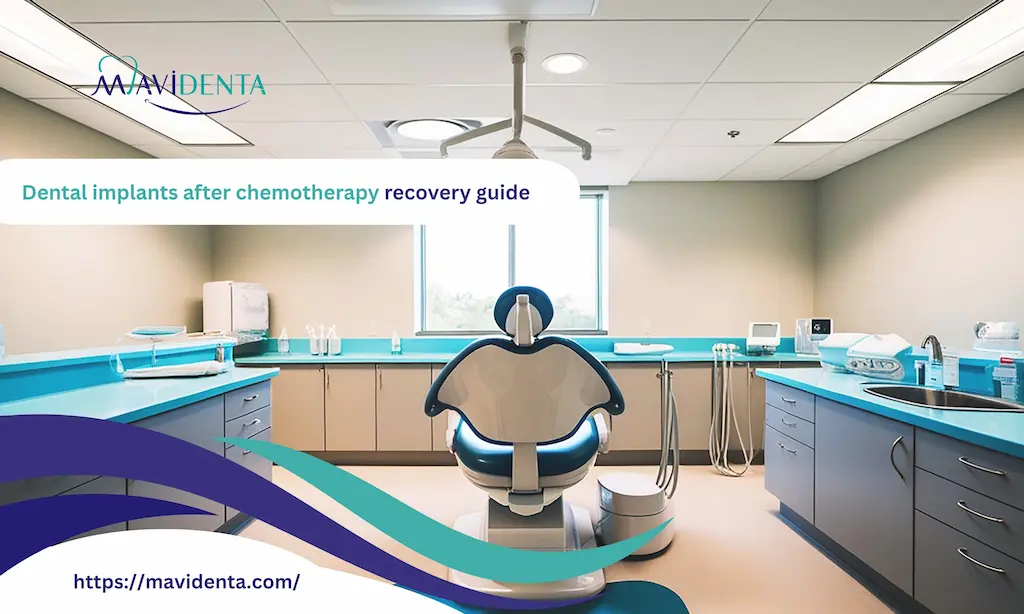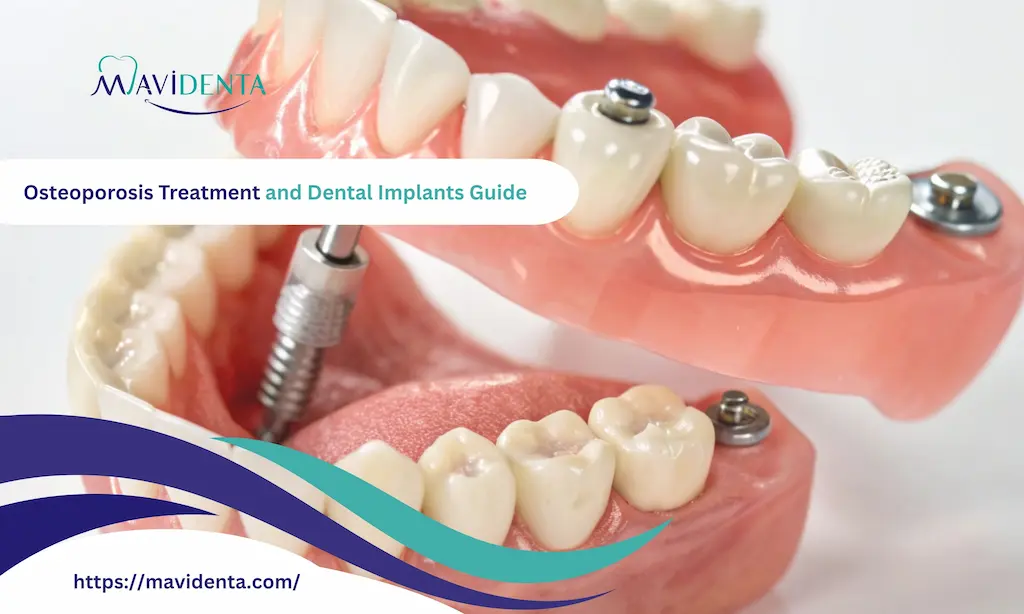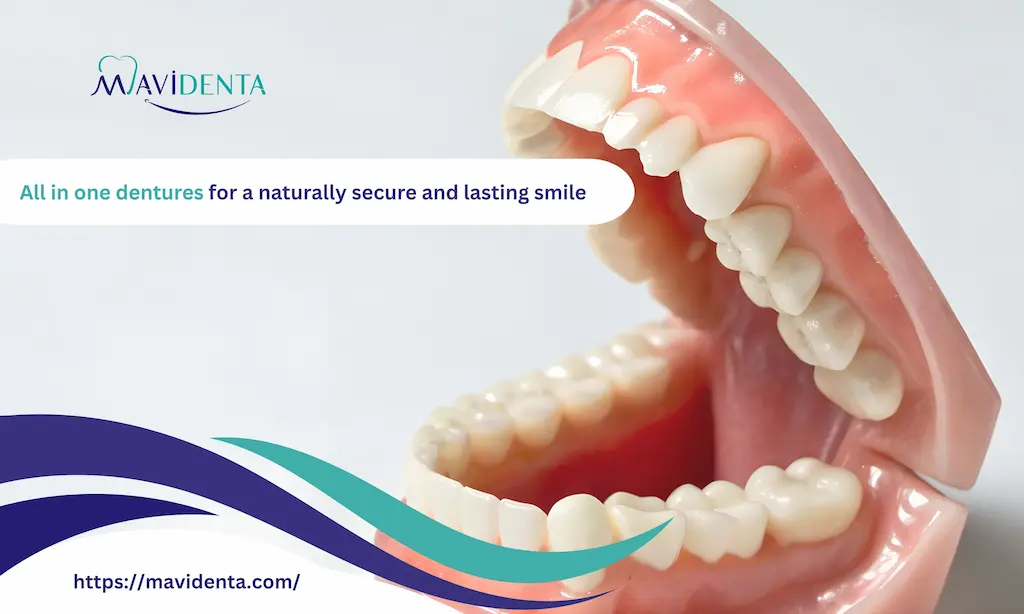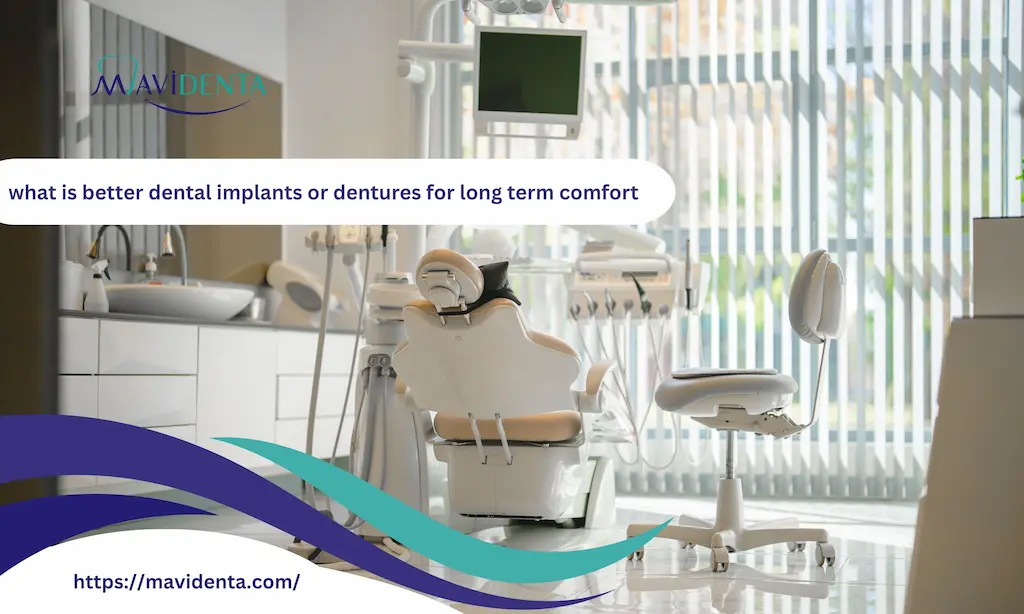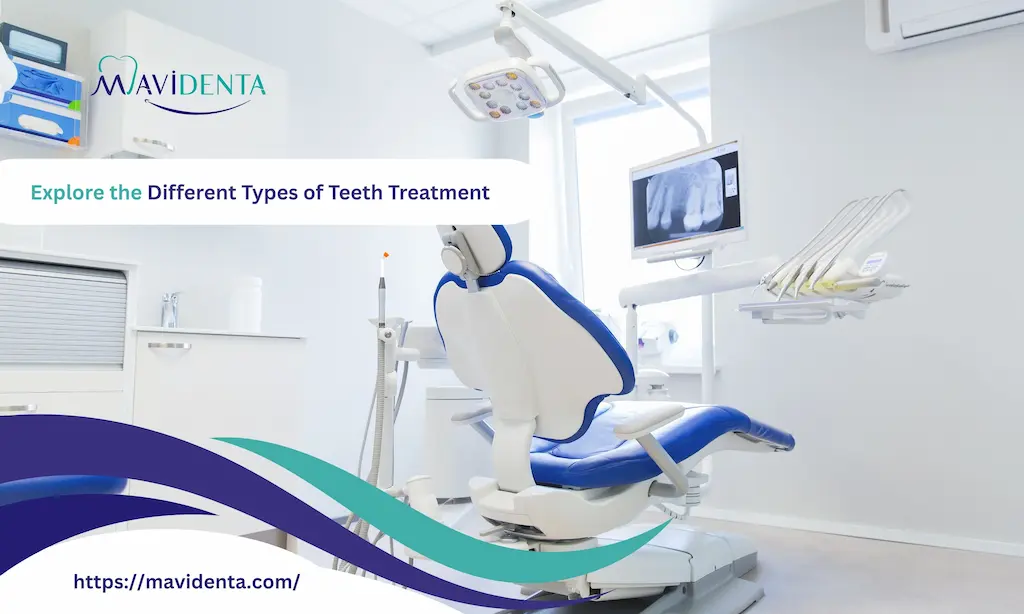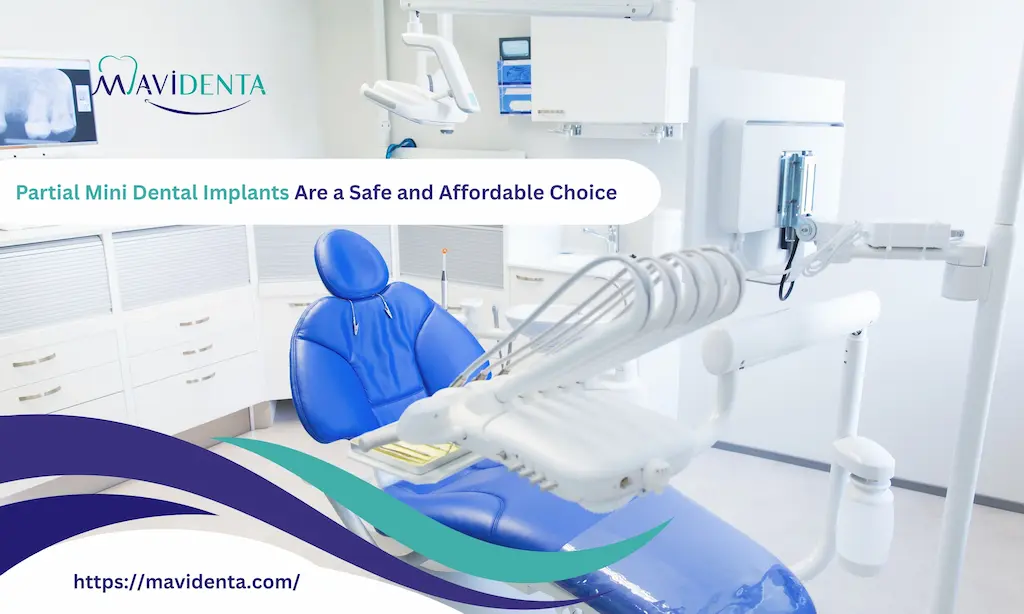Beyond only physical healing, dental implants for cancer survivors restore their smile and confidence after treatment. Dental implants after chemotherapy can be a game-changer for patients who have lost teeth due to cancer therapy.
This article will cover the effects of cancer treatments on oral structures, when dental implants should be placed after chemotherapy, and why choosing a reputable clinic like Mavidenta can be crucial to restoring your smile’s functionality and self-esteem.
Understanding How Chemotherapy Affects Dental Implants:-
The main way that chemotherapy affects dental implants is by affecting the body’s capacity to fight infection and recover, both of which are essential for the success of dental implant surgery.
Chemotherapy delays healing and may result in implant failure by targeting rapidly dividing cells, including healthy cells involved in bone repair and wound healing.
Chemotherapy weakens the immune system, raising the possibility of infections and implant-related problems. As a result, dental implant surgery is usually delayed until the patient has finished chemotherapy and their tissues and immune system have fully healed.
In order to preserve function and appearance throughout chemotherapy without the risks associated with permanent implants, temporary dentures or detachable appliances are recommended.
How Does Radiation Therapy Impact Dental Implant Success?
Using dental implants after chemotherapy is a wise choice because:
- Radiation therapy raises the chance of implant failure and complications, which has a major influence on dental implant success.
- Radiotherapy harms soft tissues and bone and decreases blood flow.
- It affects the body’s capacity to recover, which has a negative impact on osseointegration, the process by which bone integrates with an implant.
- Research indicates that dental implants in irradiated individuals are more likely to fail than in non-irradiated patients.
- The likelihood of implant failure increases significantly after radiation therapy.
Explore the Different Types of Teeth Treatment.
What Are Bone Grafting Approaches for Implant Success After Cancer Treatment?
After cancer treatment, bone grafting is a crucial surgical strategy to enhance dental implant success, particularly when radiation, chemotherapy, or surgery has damaged bone volume or quality. Reconstructive bone grafting is frequently required for cancer patients to restore sufficient bone structure for implantation.
To get dental implants after chemotherapy, there are two primary methods for bone grafting:
Technique | Procedure Details |
|---|---|
| Non-vascularized Autogenous Bone Grafts | This technique involves transferring a free fragment of the patient’s own bone to the deficient area. Although these grafts are good at increasing bone volume, they lack a blood supply of their own and rely on the surrounding tissue to integrate with them. Despite being commonly used, their survival rates are lower than those of native bone. |
| Vascularized Free Flaps | These are complex bone grafts from another part of the body that have their own blood supply. In patients with head and neck cancer, they have higher integration and survival rates, and their usage in tumor reconstruction surgery is growing. |
What Are the Risks of Dental Implant Failure After Chemotherapy?
Getting dental implants after chemotherapy carries several risks due to the effects of chemotherapy on bone healing, immune system function, and overall tissue regeneration.
Potential complications after chemotherapy include:
- Insufficient osseointegration and implant instability due to delayed or compromised bone repair at the implant site.
- Immunosuppression raises the risk of infection, which can lead to peri-implantitis and bone loss surrounding the implant.
- Loss in bone density, which threatens implants’ structural stability.
- Implant placement during or too soon after chemotherapy carries timing risks since the body’s ability to repair is still impaired.
- Potential bacterial buildup along the implant crown-post contact as a result of inadequate protection, made worse by compromised immune function and slowed healing.
Explore the Pros and cons of full dental implants guide.
When Is the Best Timing for Dental Implants After Chemotherapy?
The best timing for dental implants after chemotherapy is generally to wait several months after completing the treatment. The majority of doctors advise delaying therapy for six to twelve months to give the immune system, bone density, and general healing ability enough time to recover. The chances of infection, delayed osseointegration problems, and implant failure are decreased throughout this healing phase.
The exact timing depends on multiple factors, including:
- The kind and degree of chemotherapy.
- The patient’s general health.
- The condition of the patient’s bones.
- Other therapies needed, like radiation.
For the surgery to be planned safely, the oncologist and dental implant team must work together.
What Challenges in Dental Implant Treatments for Chemotherapy Patients?
Patients who want to receive dental implants after chemotherapy face several unique obstacles, including:
- Impaired Osseointegration and Healing: Chemotherapy affects cells that divide quickly, such as those involved in wound healing and bone regeneration. This raises the possibility of implant failure by delaying the integration of the implant with the jawbone.
- Increased Infection Risk: Immunosuppression brought on by chemotherapy reduces the body’s capacity to fight infections. Implant stability and lifetime may be compromised by peri-implant infections such as peri-implant mucositis or peri-implantitis.
- Problems with Bone Density and Quality: Chemotherapy can cause bone density to decrease and bone quality to deteriorate, which will make it more difficult for the implant to provide strong support. Longer healing periods or additional procedures like bone grafting can be required as a result.
- Problems with Timing and Treatment Coordination: Because of the body’s weakened state, implant surgery is dangerous during or right after chemotherapy. To guarantee that the patient’s immune system and healing abilities are suitable, implant placement planning needs precise scheduling and collaboration with oncologists.
- Oral Tissue Complications: Chemotherapy can lead to gum sensitivity, xerostomia (dry mouth), and mucositis, all of which impair oral health and make maintaining dental implants more difficult.
- Increased Need for Additional Operations: In order to increase implant success rates, adjunctive operations such as bone grafting or hyperbaric oxygen therapy may be necessary due to decreased bone and tissue quality.
Explore the Osteoporosis Treatment and Dental Implants Guide.

What Post-Operative Care Is Essential for Dental Implants After Chemotherapy?
To encourage healing, lower the risk of infection, and increase implant success, post-operative care for dental implants after chemotherapy is essential. Important tips consist of:
- Healing Support and Monitoring: In order to promote appropriate healing after surgery, patients should refrain from causing any disturbances to the implant site. If not self-dissolving, sutures should be managed by experts. To track osseointegration and identify early indications of infection or inflammation, close follow-up visits are essential.
- Prevention of Infections: To prevent peri-implant infections, careful dental hygiene and perhaps antibiotic prophylaxis are crucial due to immunosuppression brought on by chemotherapy. A few days following surgery, saltwater rinses can help lower the number of bacteria without causing tissue irritation.
- Activity and Dietary Restrictions: In order to stop bleeding and swelling after surgery, patients should avoid intense physical activity for a few days. During the early stages of recovery, consuming soft liquid or semi-solid meals reduces the stress on the implant site.
- Handling Oral Complications: Extra care is needed for dry mouth and mucositis brought on by chemotherapy. In order to preserve mucosal health, which promotes implant recovery, patients should drink enough water and may need topical therapies.
- Multidisciplinary Coordination: Ongoing communication between the dental specialist and oncologist can minimize difficulties by swiftly addressing any changes in systemic health or medication.
- Long-Term Follow-Up: After initial healing, routine dental examinations help preserve implant health, guard against gum disease, and guarantee long-term success.
How to Choose the Right Dental Implant Clinic for Patients After Chemotherapy?
To ensure safe, effective dental implants in patients receiving chemotherapy, dental clinics should have:
- Expertise in Treating Cancer Patients: The clinic should have oral surgeons or dentists with expertise in treating patients who have had chemotherapy and other cancer therapies.
- Multidisciplinary Coordination: To ensure medical stability and the best possible implant results, the clinic must work closely with oncologists and other experts to coordinate scheduling and care.
- Advanced Diagnostic Capabilities: Clinics should do comprehensive evaluations of oral health, blood supply, bone quality, and risk factors, including gum disease or dry mouth, that are unique to patients receiving cancer therapy.
- Use of Adjunctive Therapies: To promote healing and implant success in damaged tissues, the clinic should provide or arrange adjunct therapies such as bone grafting or hyperbaric oxygen therapy as needed.
- Positive Track Record: Search for dental implant clinics that have a track record of successfully treating cancer survivors.
How to Choose the Best Dental Implant Clinic in Istanbul?
Why Mavidenta Is the Best Place for Dental Implants?
- Professional Treatment for Complicated Cases: Mavidenta’s skilled implant surgeons provide safe, individualized treatment for patients with medical histories such as chemotherapy.
- Advanced Technology: To increase the likelihood of stable bone integration and reduce the risk of problems for patients who have received chemotherapy, the clinic uses the most recent digital implant planning.
- Premium Implant Materials: Only premium brands from Germany, Switzerland, and the United States are used, ensuring long-term durability and a lifetime warranty.
- Complete Patient Support: Patients from other countries are provided with all services, such as accommodation, lingual support, and airport transportation.
- Tailored Treatment Plans: Mavidenta works with your oncologist to evaluate bone health, healing potential, and recovery schedule.
- Improved Aftercare: After chemotherapy, ongoing monitoring is provided to guarantee the best possible healing and implant success.
Conclusion
Getting dental implants after chemotherapy can significantly improve your quality of life by restoring your confidence and function. Mavidenta’s modern technology, knowledgeable implant experts, and individualized treatment tailored to post-chemotherapy needs make it stand out as the perfect place for cancer survivors.
After chemotherapy, you can rely on Mavidenta to help you safely and confidently recover the health and beauty of your smile with extensive aftercare and global patient support.
FAQS
Is it painful to get dental implants?
No, because the dental implant surgery is done under local anesthetic, it is not painful. However, you could experience pressure or vibrations. Yet, some tightness or discomfort is to be expected after the treatment.
How long to wait for dental treatment after chemotherapy?
Before receiving most dental care after chemotherapy, you should wait for your blood counts to stabilize, especially for your platelet count to be above 50,000 μL and neutrophil count to be above 1,000/mm3. To choose the best timing, it’s also critical to speak with your dentist and oncologist.
Can I go to the dentist after chemo?
After chemotherapy, you can see the dentist, but it’s important to consult your oncologist first and hold off until your blood levels have stabilized. Invasive operations should be avoided until your immune system has recovered, but a routine dental examination is advised to address any problems that may have developed during treatment.
Does chemo affect dental implants?
Yes, chemotherapy can have an influence on dental implants by affecting the body’s ability to recover, raising the possibility of infection, and causing side effects like dry mouth that can compromise oral health in general.

